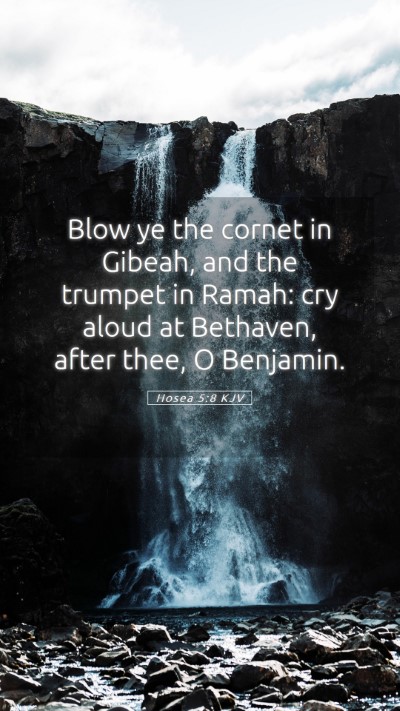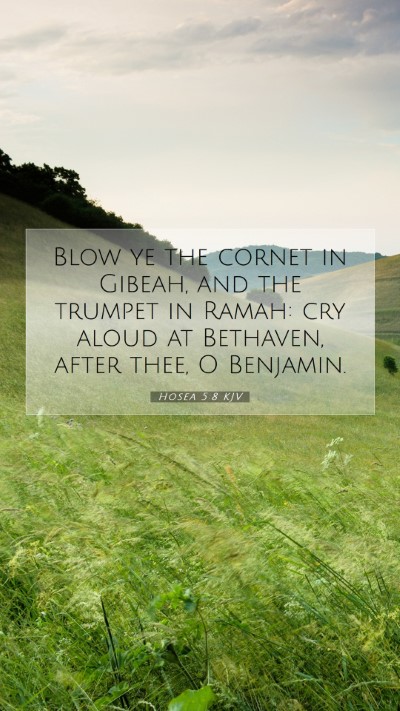Old Testament
Genesis Exodus Leviticus Numbers Deuteronomy Joshua Judges Ruth 1 Samuel 2 Samuel 1 Kings 2 Kings 1 Chronicles 2 Chronicles Ezra Nehemiah Esther Job Psalms Proverbs Ecclesiastes Song of Solomon Isaiah Jeremiah Lamentations Ezekiel Daniel Hosea Joel Amos Obadiah Jonah Micah Nahum Habakkuk Zephaniah Haggai Zechariah MalachiHosea 5:8 Meaning
What is the meaning of Hosea 5:8?
Blow ye the cornet in Gibeah, and the trumpet in Ramah: cry aloud at Bethaven, after thee, O Benjamin.
Hosea 5:8 Bible Verse Meaning
Understanding Hosea 5:8: A Comprehensive Commentary
Hosea 5:8 states: "Blow ye the cornet in Gibeah, and the trumpet in Ramah: cry aloud at Beth-aven, after thee, O Benjamin!" This verse is a call to alert the tribes of Israel regarding impending judgments and calamities.
Contextual Background
The Book of Hosea serves as a profound commentary on Israel's unfaithfulness to God. Through vivid imagery and poetic speech, Hosea conveys God's heartbreak over His people's infidelity. Understanding this verse requires a grasp of both the historical context and the symbolic meanings encapsulated within it.
Bible Verse Meanings and Interpretations
The prophetic call in Hosea 5:8 is significant for several reasons:
- Warning of Impending Judgment: Hosea expresses God's urgent call for repentance through the sound of trumpets, symbolizing an alert to the people for their imminent downfall if they do not turn back to Him.
- The Role of Gibeah and Ramah: These locations were historically significant in Israelite history, emphasizing the seriousness of God’s message to locations associated with betrayal and sin.
- Beth-Aven Imagery: This name means "house of idolatry," indicating that the people are being called to recognize the false worship that pervades their lives.
Insights from Public Domain Commentaries
Matthew Henry's Commentary: Matthew Henry stresses the themes of warning and consequence. He elaborates that the sound of the trumpet signifies a call to repentance. Henry emphasizes that the purpose of such a call is not mere alarm but a path to restoration, urging for true contrition among the tribes.
Albert Barnes' Notes: Barnes places a strong emphasis on the geopolitical implications of the trumpet call. He argues that the nations surrounding Israel should take heed, as the impending approach of judgment is a collective call not only for the Israelites but for neighboring countries as well. There’s a sense of urgency here, highlighting the national crisis facing Israel at that moment.
Adam Clarke's Commentary: Clarke provides a more detailed historical analysis, illuminating the significance of the locations Gibeah and Ramah. He connects the prophetic call with Israel's past, warning them not only of their current state but also of the historical consequences of their decisions. His emphasis is on the need to return to genuine worship absent of idolatry.
Bible Verse Explanations
This verse demands that readers engage in Biblical exegesis to note its rich layers of meaning:
- Historical Context: The verses are placed within a period of moral decay and idolatry among the Israelites, which frames the urgency of the prophetic call.
- Symbolism of the Trumpet: The trumpet symbolism served both as a military alert and a spiritual clarion call, reminding Israel of their covenant relationship with God.
- Call to Action: The verse not only serves as a prophetic warning but also fosters community reflection within Bible study groups and online Bible study settings, encouraging collective repentance.
Application to Daily Life
To incorporate the lessons of Hosea 5:8 into contemporary life, individuals can contemplate:
- How audible warnings appear in their lives today, prompting them to seek God afresh.
- The importance of recognizing and eliminating modern idols that distract from genuine faith.
- Ways to foster community accountability and spiritual growth within their circles, particularly through Bible study lessons.
Cross References
This verse finds resonance in other scriptures, reinforcing the themes presented:
- Joel 2:1: A similar prophetic call to alarm the people regarding the day of the Lord.
- Isaiah 58:1: Calling out to God’s people to repent and return to authentic worship.
- Amos 3:6: The use of sounding the trumpet as a warning of approaching harm.
Conclusion
Hosea 5:8 serves as a poignant reminder of the repercussions of turning away from God. Through understanding this scripture, individuals can gain enhanced Bible study insights and a deeper grasp of Scripture analysis. In exploring the meaning of Bible verses, we encounter essential truths that guide our spiritual journey and our relationship with God.


